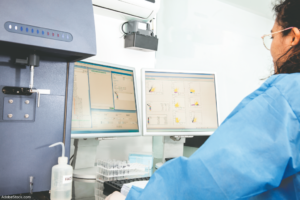 For patients with rheumatoid arthritis (RA), analyzing immune cell diversity in peripheral blood revealed five major immunotype groups, each exhibiting a different response to various biologic or targeted synthetic disease-modifying anti-rheumatic drugs (DMARDs). This is according to a 2024 study published in Annals of the Rheumatic Disease that aimed to stratify the patients based on their immunophenotypes, providing a basis for precision medicine.
For patients with rheumatoid arthritis (RA), analyzing immune cell diversity in peripheral blood revealed five major immunotype groups, each exhibiting a different response to various biologic or targeted synthetic disease-modifying anti-rheumatic drugs (DMARDs). This is according to a 2024 study published in Annals of the Rheumatic Disease that aimed to stratify the patients based on their immunophenotypes, providing a basis for precision medicine.
“The primary focus in the treatment strategy for RA is the achievement of precision medicine,” explains first author Satoshi Kubo, MD, PhD, an associate professor in the Department of Molecular Targeted Therapies of the University of Occupational and Environmental Health, Kitakyushu, Japan. “In this study, we analyzed immunophenotyping data from the peripheral blood of over 700 RA patients who had never received molecular targeted therapies, and we discovered three significant insights.
“First, the immunophenotypes of these patients are not uniform, but can be categorized into five distinct clusters. Second, each cluster, defined by immune phenotype, responds differently to various molecular targeted therapies. Third, a subset known as CD4 TEMRA may play a critical role in the pathology of some patients. The significance of these findings is as follows.
“The treatment of RA, as recommended by EULAR, involves phases 1, 2 and 3, with five classes of molecular targeted drugs used in phase 2 and beyond. However, there are no biomarkers for selecting these treatments. If it were feasible to implement the optimal molecular targeted therapy from the beginning—essentially employing a precision-medicine approach—the treatment of RA could be fundamentally transformed. Despite considerable efforts by many researchers, this goal has yet to be realized.”
Dr. Kubo continues, “In our study, we demonstrated that peripheral blood immunophenotyping could aid in selecting targeted molecular therapies, a finding we validated using a cohort. Our research illustrates a potential pathway for the realization of precision medicine.”
Immunophenotyping Study
The study included 533 patients with RA who were biologic or targeted synthetic DMARD naive and 96 healthy controls without autoimmune rheumatic diseases. The patient cohort included 76.4% women with a mean age of 63.5 years; 70.7% tested positive for the presence of anti-cyclic citrullinated peptide antibodies; 71.1% received methotrexate; and the mean Clinical Disease Activity Index (CDAI) stood at 27.1.
The healthy control cohort also comprised mainly women, at 70.8%, but the patients were younger, with a mean age of 47.6 years.


